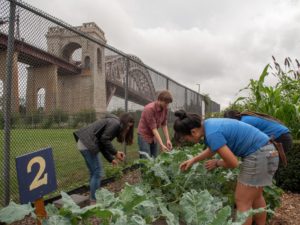Extension Plants Seeds for Urban Growth
CCE Harvest New York urban agricultural specialists travel from their Brooklyn office by bus, subway and ferry providing educational programming and on-site technical assistance in all five boroughs for commercial vegetable growers and non-profits operating commercial urban gardens.

In the shadow of New York City’s Hell Gate Bridge, Cornell Cooperative Extension urban agriculture specialists Yolanda Gonzalez, left, and Sam Anderson, center scout for harlequin bugs and consult with farmers at Randall’s Island Urban Farm in New York City.
R.J. Anderson / Cornell Cooperative Extension
From the rooftops of New York City to the weathered sidewalks of inner-city Buffalo, urban farms are sprouting vegetables, fueling businesses and helping grow vibrant communities across the Empire State. Working these small plots are farmers young and old from backgrounds as diverse as their agricultural needs and challenges. Helping these farmers make the most of confined spaces and unique environments are urban agriculture specialists from Cornell Cooperative Extension (CCE).
In New York City, CCE Harvest New York urban agricultural specialists Sam Anderson and Yolanda Gonzalez travel from their Brooklyn office by bus, subway and ferry providing educational programming and on-site technical assistance in all five boroughs for commercial vegetable growers and non-profits operating commercial urban gardens.
“One thing I love about working in agriculture in this city is that there’s such variety,” said Anderson. “One day we’re visiting an outdoor aquaponics setup where there’s goldfish on one side and okra growing in floating rafts on the other. Then the next day we’re visiting a rooftop farm with a view over the Hudson River and the next we’re in the Rockaways, on a farm half a block from the beach.
“However, a lot of people in the city are coming into agriculture from a gardening background or from an activist background or from an interest in food or social justice,” he continued. “Not many are coming into it with a commercial vegetable-growing background. So we try to provide the most recent plant science research, food safety best practices and help them improve profitability by better utilizing their limited growing space.”
That includes hosting workshops to help current and prospective urban farmers understand and adopt general food safety best practices and clarify confusion around food safety rules. This includes differences between buyer-imposed programs like GAP certification (Good Agricultural Practices), and government-enforced food safety regulations such as FDA Food Safety Modernization Act. Harvest New York also provides one-on-one technical assistance to both soil-based and controlled environment agriculture producers on GAP certification requirements and food safety plans.
“We’ve found that most of these producers do not have a previously written food safety plan,” said Gonzalez. “Through our consults with local larger-scale urban farms on food safety certifications options, we’ve been able to to open more doors for selling produce directly to distributors and retail outlets, such as the new Wegmans supermarket slated to open in Brooklyn.”
Four hundred miles away in Buffalo, Cornell Vegetable Program specialist Judson Reid has spent nearly four years working with the Green Shoots for New Americans Refugee Agricultural Program, providing technical assistance at its Brewster Street teaching farm. Featuring raised beds and a high tunnel, the tiny organic farm is situated in an inner-city neighborhood with low access to fresh fruits and vegetables.
On the farm, newly resettled refugees from the Democratic Republic of the Congo, Nepal, Bhutan and Myanmar grow produce that is sold locally through a CSA, at Farmer’s Markets and in local restaurants, and shared with families in the neighborhood.
“Cornell Cooperative Extension plays a very important part in providing technical assistance to what we do here,” said Jenna Walczak, the program’s farm manager. “A lot of our participants have agriculture experience in their home countries, but it’s a little different here in regard to climate and some of the technical aspects. Experts like Jud help us decide when, where and what to plant it and help us trouble shoot plant disease issues.”
“I love seeing the production techniques that I’ve worked with in rural settings employed in an urban setting,” said Reid. “For example, over the past five years I’ve been studying how to optimize high tunnels to extending the growing season and maximize profitability. On the Brewster Street farm, I’m able to apply those principles by showing the farm how to grow tomatoes using vertical trellises and utilize advanced integrated pest management and soil fertility techniques.”
Reid and educators from CCE’s Erie County association also help participants learn basic agribusiness skills. “We hope as they learn to manage a budget in terms of what are the inputs to grow the crop, how do we need to price it, and how much yield do we need to achieve in order to be profitable and move the project forward,” said Reid.
Reid believes CCE’s role in urban agriculture allows the organization to achieve its mission by putting research-based knowledge in the hands of people – in this case who want to grow their own food to eat, or grow food as a business – and do so in a way that is environmentally and economically sound. Reid added: “And we often find that urban agriculture gives people an opportunity to develop a sense of belonging, a sense of contribution to the greater community.”

